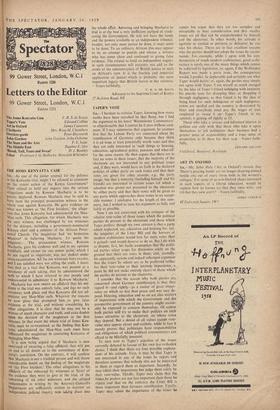Letters to the Editor
99 Gower Street, London, W.C.1
Euston 3221
The Jumo Kenyatta Case. F. R. S. de Souza
Taper's Vote i Edward Collins
Art in Oxford James Cameron Clerihews Mrs. Rosa M. Chanibers
Derriere-garde Peter Heyworth
John Gordon John Gordon, John Osborne The State and the Arts F. E. Isaac The Middle East Daphne E. Slee 'Blood, Toil, Tears and Sweat' D. J. Bentley Litter Professor J, G. Bullocke, Meredith Whittaker
THE JOMO KENYATTA CASE
SIR,—As one of the junior counsel for the defence in the Kenyatta trial, might I he allowed to comment on the recent action of the Kenya Government? Their refusal to hold any inquiry into the serious allegations made by Rawson Macharia is to be greatly deplored. Rawson Macharia may he said to have been the principal prosecution witness in the Whole case against Kenyatta. He gave evidence on what was known as 'the First Incident,' the allega- tion that Jomo Kenyatta had administered the Mau- Mau oath. This allegation, for which Macharia was the only witness, was challenged by ten witnesses for the defence, including a government-nominated Kikuyu chief and a minister of the African Pente- costal Church. The magistrate had 'no hesitation Whatever' in believing Macharia. To quote his judgment : 'The prosecution witness, Rawson Macharia, gave his evidence well and in my opinion truthfully and except on one minor point, which I do not regard as important, was not .shaken under cross-examination. Al] the ten witnesses Were evasive, and I am satisfied were not telling the truth. I there- fore find as a fact that Kenyatta was present at a Ceremony of oath taking. that he administered the oath to which I have referred to two people and endeavoured to administer it to Rawson Macharia.'
Macharia has now sworn an affidavit' that his evi- dence at the trial was entirely false, and thitt no such ceremony took place and that Kenyatta did not ad- minister any Mau-Mau oath. Whatever the reasons he now gives that prompted him to give false evidence at the trial, and without considering his other allegations, it is clear that he may not be a witness of much character and truth, and casts doubts Upon the decision of the magistrate in the first instance. In that event the whole trial of Jomo Ken- Yatta must be re-examined, as the finding that Ken- Yatta administered the Mau-Mau oath must have influenced the magistrate in convicting Kenyatta of Managing Mau-Mau.
It is now being argued that if Macharia is now convicted of swearing a false affidavit, that will put an end to all doubt as to the correctness of Ken- Yalta's conviction. On the contrary, it will confirm that Machada is not a truthful person and will throw Considerable doubt on the finding' of the magistrate on 'the First Incident.' The other allegations in his affidavit of the rehearsal by witnesses at Nyeri of the evidence they were to give at the trial, of the suborning of six other witnesses, and the alleged inducements in writing by the Attorney-General's Department are sufficiently serious to warrant an independent judicial inquiry now taking place into
the whole affair. Arresting and bringing Macharia to trial is at the best a very inefficient method of vindi- cating the Government. He will not have the funds and the powers available to an independent tribunal; besides, not only must justice be done, it must seem to be done. To an ordinary African this may appear to be an attempt to punish and silence a witness who has come clean and confessed to giving false evidence. The refusal to hold an independent inquiry in such circumstances will certainly not add to the credit of the administration of British justice in such an African's eyes. It is the fearless and impartial application of justice \ which is probably the most important legacy that Britain leaves 'in her colonies. --Yours faithfully,
F. R. S. DE SOUZA
Advocate to the Supreme Court of Kenya 27 Redston Road, N8










































 Previous page
Previous page